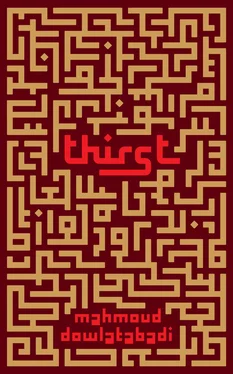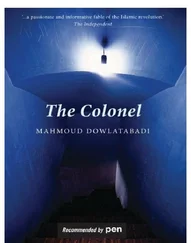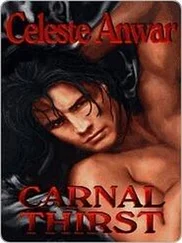‘My heart … my heart … my heart.’ This was the first time my heartbeat had escalated with such rapidity with the writing of each word. No, it wasn’t a result of smoking the cigarette. It was the words that were to blame. Sucking blood, sucking from the gashed wound on a finger of a hand. Yes, it was at that point when my heart began to palpitate faster with every word I wrote. I could feel it happening, moment by moment. It was the first time; prior to this, such a thing had never happened. But I wasn’t afraid. I didn’t wake up any of my family. I had tranquillizers at hand. I put my pen down and stood up. I wasn’t afraid, but at the same time I wasn’t able to continue. The words were bursting my heart. The words must not kill me, the words are not permitted to take away my life. I stood up and reached for a glass of water without thinking. It didn’t occur to me that my body might be dehydrated, and that a lot of blood had drained out of the wound on my finger. I stood up, took a gulp of water and straight away collapsed. I fell on my back and put my hand to my brow, my temple. What had struck me down so quickly and violently? Where was a doctor to explain what had happened to me? To reassure me that words aren’t able to explode the brain of their author?
If this man, this side of the border and at the foothills of the Alborz Mountains, willed himself to take notes day and night, he would write in the same way I have and admit that the name ‘dove’ had calmed him down. Just the word ‘dove’, the writing of it and the way he could complete his sentence with this word have all probably ensured that his brain or heart wouldn’t burst!
Once again a brief telephone call asking why hadn’t I written anything about the war?
‘But I have written something about the war — haven’t you read it?’
‘How? Where?’
‘It’s been published only once, maybe you were a child or a teenager back then.’
He pauses and asks: ‘I mean fiction. A novel …’
‘Rest assured, I won’t be late submitting it! But who am I speaking to, please?’
The person on the other end of the phone hangs up, and the line goes dead.
If this man at the foot of the Alborz wanted to write a diary, he should have kept a log of how many times he has had to answer such calls and what kind of answers he has given, but what can a person do who believes the entire business of existence in these times isn’t worth the effort of detailed scrutiny, night or day?
‘ Talie … talie … in ancient times, a soldier in such a forward position would be called talie . The word talie derives ultimately from a word for the dawn, and by extension means ‘vanguard’, ‘standard bearer’, ‘herald’ or ‘rider’. The talie probe the enemy’s defences, right and left, while their own main army waits in the rear. They intercept potential deserters, mounted and with their blades drawn, ready to behead anyone fleeing the front. Oh you cowards! But talie also implies suddenly emerging in front of the enemy, like the night-rovers who penetrated the enemy camps. So here I am now, a talie who must not be seen. My banner is invisible and my flag is the earth into which I have burrowed so as to remain unobserved. But before I die, I must take down that skilful sniper. Show me the way, O dove! Angels materialize in your image. Reveal a path to me so that death makes me forget its petty meaning. But why do I feel as if my shoulders have been bound? In ancient hand-to-hand combat, the illusion of valour and chivalry was nothing but a veil to cover the abomination of slaughter. But now I must summon up strength of purpose, I must recall those acts of courage which this tract of land has no doubt witnessed on many occasions. Here, on this meadow and along these paths. I have no choice in this matter! But why do I feel as though my shoulders have been bound? Just like the shoulders of this unfortunate prisoner?’
‘Well, well first lieutenant on duty, Abu Muslim, Laith Saffari, Babak Khorramdin, Qarmati, Sepid Jam-e, and Nakhshabi! O warrior! You’re in deep! You’ve fallen into a trap that they set for wolves. You’ve been had, O you progenitor of all races and ideals, O wayward child of times present and past! Did you harbour naïve hopes or …’
Are you teasing me, Dove? Mocking me?’
‘No, I’m not teasing you. This is deadly serious.’
‘I know.’
‘A literal dead-end.’
‘Yes … Every fibre of my body and brain tells me so.’
‘So … what about you?’
‘I still exist, Dove.’
‘You haven’t been incapacitated yet, then?’
‘No, as you can see, I’m still here.’
‘Being … yes, you’re a being. But it only takes a “non” to turn “being” into “non-being”.’
‘Are you trying to frighten me, Dove? I’ve read about, heard and seen the state of non-being with my own eyes. And I have not come from the desert of non-being just to be returned to it. You know I have taken the name of a bird. A bird cannot be destroyed, rather, a bird is besmel ed. ‡That is the non-being that we mentioned in the beginning together, you and I.’
‘But you’re thirsty, aren’t you?’
‘Yes … and down there is water. A little hope perhaps?’
‘It depends on how long you can survive in the name of “dove”. And on how long it will be before you succumb to fatigue. You are, after all, made of skin and bones and nerves!’
‘Dove … dove …’
‘Daybreak is approaching, the infernal sun.’
‘I will put an end to this before dawn, Dove, before the dawn arrives and sunlight appears!’
‘Why don’t you pay a visit to the neighbouring trench?’
‘You’ve read my mind there. I’d thought of doing precisely that. I’ll be there in a moment. I’m here to conquer, Bird, after all. I’m here to win a battle, so I don’t have any other choice, do I? Death is my only option! The water tank is down there. In a secure location. I’ve lost five men already trying to get to the water tank. I have to fetch that water myself. I’ll bring back all of the water bottles full. But …’
‘Yes. It is exactly as you see. The enemy troops were also seven in number, and now …’
‘Aaaaah! No doubt their lips are cracked and so is the skin on their hands. And their faces have all shed skin … teenagers … aaaah … my young men … is this how you were hushed up?’
‘Yes, warrior! They got there sooner than you. They were quicker and braver. You can check their heartbeat with your ears. Maybe some of them still have a pulse.’
‘Yes … yes … maybe water will be still useful.’
‘It’s much easier than bringing water up, and burying corpses is much harder than providing water …’
‘… or getting besmel ed while bringing water up. I don’t want to die this easily, no! They’ve left their guns for me — my inheritance. And one of them is from a religious minority, he has two chains and plaques round his neck. Two! They all tore their collars in frustration, Dove. Suffocation … When the blood can’t make its way to the brain … Ah … if only I could wash the dust off them with a bottle of water. I will return, my men … for the time being, I will borrow one or two weapons and these flasks. And you, my friend, put the receiver of the radio telephone back on its cradle, it’s stuck in your hand. I will return … I will return. You can count on it. We will see each other, either here or somewhere up there. Bah … he can’t even hear what I’m saying … his brain, with what little strength remains, receives the message, but his tongue is unable to speak. He cannot respond. Is it not so, Dove? Jamoo, wrap the soles of my feet in rags, will you! Quickly and skilfully. Patak! §They call this patak ! It’s a winter binding for the feet. But if you don’t want the sound of your footsteps to be heard, it can be useful in this season as well. Now take these — there’s one, two, three sniper magazines for you. I want you to focus your fire on the spot where the shooting is coming from. And here is a machine-gun magazine in case our enemy loses his head and emerges firing from his foxhole. And now all that remains is our captive friend … let me see if his hands are tied securely enough behind his back. Tight. Yes, like that. I’ll lay him facedown, on the hill, with his head pointing down the slope. I know … he’ll puke up whatever’s inside him. But there’s nothing left in his stomach. What choice do I have other than to be cruel? We’re taught never to assume that the enemy is weak. I’m taking these measures for your protection, Jamoo — Dove! You must remain alert and your mind must be calm. You do understand me, don’t you? Answer by nodding your head if you understand, and if you can manage it, say something too, anything. Come on boy, dawn is breaking. We have to say goodbye! Say it … Dove!’
Читать дальше












